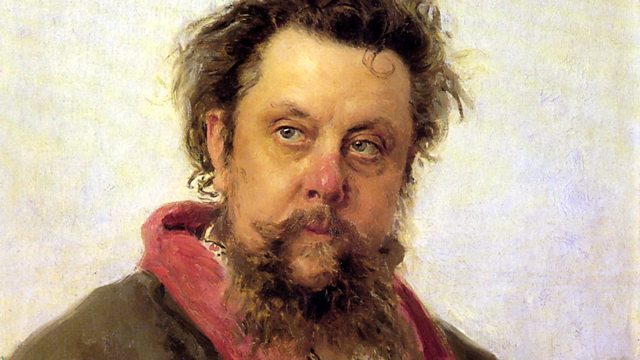
Boris
Donald Macleod explores the music of Mussorgsky, focusing on his songs. The tortured history of the two operas Mussorgsky called Boris Godunov.
This week Donald Macleod explores the music of Mussorgsky, with a particular focus on his songs. Today, the tortured history of the two operas Mussorgsky called Boris Godunov.
"When an artist revises, it means he is dissatisfied", Mussorgsky once told his friend Rimsky-Korsakov. That's as may be, but Mussorgsky embarked on his revisions to the first version of his opera about the troubled Russian Tsar because it had been rejected by the music committee of the Directorate of the Imperial Theatres in St Petersburg. The committee objected not to the depiction of a Tsar on stage, but - rather bizarrely to our ears - to the "originality and freshness" of the music, and also, and perhaps crucially, to the absence of "an important female role". To beat the ban, evidently Mussorgsky could have got away with adding a single scene for a prima donna, but he seems to have been genuinely galvanized by the opportunity to reconsider his work, and ended up supplying an entirely new act, as well as an additional final scene. The opera was well received on the premiere of this revised version in 1874, but after Mussorgsky's tragically early death only seven years later, Rimsky-Korsakov took it upon himself to produce a new, 'improved' version of the score, and it was in this inauthentic version that audiences were to hear Boris Godunov for many years to come. Only with the David Lloyd-Jones edition of 1975 was the opera again heard in a form close to that in which the composer had conceived it.
Boris Godunov (Rimsky-Korsakov version); Prologue, conclusion ("Slava! Slava! Slava!")
Chorus of the National Opera of Sofia
Orchestre de la Société des Concerts du Conservatoire
André Cluytens, conductor
Boris Godunov (original 1869 version, ed. David Lloyd-Jones); Pt 2 scene 2, conclusion ("Slava! Slava! Slava!")
Kirov Chorus and Orchestra, St Petersburg
Valery Gergiev, conductor
'Where art thou, little star?'
Boris Christoff, bass
Alexandre Labinsky, piano
Boris Godunov (Rimsky-Korsakov version); Act 2 scene 2
Ludovic Spies, tenor (Dmitri)
Zoltan Kélémen, bass-baritone (Rangoni)
Galina Vishnevskaya, soprano (Marina Mnishek)
Sofia Radio Chorus
Vienna Philharmonic
Herbert von Karajan, conductor
Boris Godunov (1872 version, ed. David Lloyd-Jones); Act 2, conclusion
Vladimir Vaneev, bass (Boris Godunov)
Yuri Laptev , baritone (Boyar-in-attendance)
Zlata Bulycheva, mezzo soprano (Fydor)
Konstantin Pluzhnikov, tenor (Shuisky)
Kirov Chorus and Orchestra, St Petersburg
Valery Gergiev, conductor.
Last on
Music Played
-
![]()
Modest Petrovich Musorgsky
Boris Godunov - Prologue
Singer: Boris Christoff. Singer: Ana Alexeyeva. Singer: John Lanigan. Choir: Sofia National Opera Chorus. Orchestra: Paris Conservatoire Concert Society Orch. Conductor: André Cluytens.- EMI : CDS-7479938.
- EMI.
- 17.
-
![]()
Modest Petrovich Musorgsky
Boris Godunov - Act 2 (extract)
Singer: Nikolai Putilin. Singer: Konstantin Pluzhnikov. Orchestra: Mariinsky Orchestra. Conductor: Valery Gergiev. Choir: Kirov Theatre Chorus.- PHILIPS : 462 230-2.
- PHILIPS.
- 1.
-
![]()
Modest Petrovich Musorgsky
Gde Ti, Zvezdochka? (where Art Thou, Little Star?)
Performer: Alexandre Labinsky. Singer: Boris Christoff.- EMI : CDH-7630262.
- EMI.
- 1.
-
![]()
Modest Petrovich Musorgsky
Boris Godunov - Act 2 (extract)
Orchestra: Vienna Philharmonic. Conductor: Herbert von Karajan. Singer: Nicolaï Ghiaurov.- DECCA : 411-862-2.
- DECCA.
- 10.
-
![]()
Modest Petrovich Musorgsky
Boris Godunov - Boris's monologue (I have attained the highest power)
Singer: Nikolai Putilin. Orchestra: Mariinsky Orchestra. Conductor: Valery Gergiev.- PHILIPS : 462 230-2.
- PHILIPS.
- 6.
Broadcasts
- Wed 27 Sep 2017 12:00����ý Radio 3
- Wed 27 Sep 2017 18:30����ý Radio 3
Beethoven Unleashed – the box set
What was really wrong with Beethoven?
Composers A to Z
Who knew? Five eye-opening stories from Composer of the Week
Five reasons why we love Parry's Jerusalem
What is the strange power of Jerusalem which makes strong men weep?
A man out of time – why Parry's music and ideas were at odds with his image...
The composer of Jerusalem was very far from the conservative figure his image suggests.
Composer Help Page
Find resources and contacts for composers from within the classical music industry.





